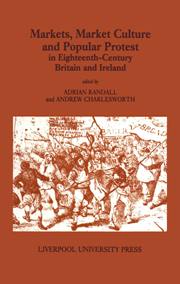Book contents
- Frontmatter
- Contents
- Contributors
- Preface
- 1 Markets, Market Culture and Popular Protest in Eighteenth-Century Britain and Ireland
- 2 Popular Protest and the Persistence of Customary Corn Measures: Resistance to the Winchester Bushel in the English West
- 3 The Jack-a-Lent Riots and Opposition to Turnpikes in the Bristol Region in 1749
- 4 The Cider Tax, Popular Symbolism and Opposition in Mid-Hanoverian England
- 5 Scarcity and the Civic Tradition: Market Management in Bristol, 1709–1815
- 6 The Moral Economy of the English Middling Sort in the Eighteenth Century: the Case of Norwich in 1766 and 1767
- 7 Oxford Food Riots: a Community and its Markets
- 8 The Irish Famine of 1799–1801: Market Culture, Moral Economies and Social Protest
- Index
8 - The Irish Famine of 1799–1801: Market Culture, Moral Economies and Social Protest
- Frontmatter
- Contents
- Contributors
- Preface
- 1 Markets, Market Culture and Popular Protest in Eighteenth-Century Britain and Ireland
- 2 Popular Protest and the Persistence of Customary Corn Measures: Resistance to the Winchester Bushel in the English West
- 3 The Jack-a-Lent Riots and Opposition to Turnpikes in the Bristol Region in 1749
- 4 The Cider Tax, Popular Symbolism and Opposition in Mid-Hanoverian England
- 5 Scarcity and the Civic Tradition: Market Management in Bristol, 1709–1815
- 6 The Moral Economy of the English Middling Sort in the Eighteenth Century: the Case of Norwich in 1766 and 1767
- 7 Oxford Food Riots: a Community and its Markets
- 8 The Irish Famine of 1799–1801: Market Culture, Moral Economies and Social Protest
- Index
Summary
In Ireland, as in Britain, market forces exercised a powerful influence over the later eighteenth-century agrarian economy. Local marketing systems, with the numerous modest market towns drawing foodstuffs from limited hinterlands, were themselves subsumed in a national marketing system which embraced most of the country, with perhaps the partial exception of the remotest parts of Connacht. Dublin demand for food exercised a pervasive influence over the country, roughly paralleled by London's predominance on the mainland. However, in Ireland, a countervailing force derived from the much larger British market, which sucked in exports of oats, oatmeal, wheat, meat and dairy products from Ireland. Capitalism was central to Irish agricultural production, distribution, manufacture, retail, and export. Whatever the difference of scale, diese similarities between food-marketing systems in Britain and Ireland have not generated much comparative study of responses to food shortages, dearth, and even famine in die two countries. In Britain, E. P. Thompson's critical concept of the moral economy, notably die key role of die various forms of food rioting, has been widely debated. Curiously, Irish experiences and evidence have been largely excluded. Irish evidence is important in its own right, diough it is vital diat it should be firmly located widiin an Irish context. The food supply to die Irish was affected by its colonial status, and in die immediate aftermath of die rebellion of 1798, by further complications deriving from die political situation as die audiorities struggled to extinguish die residues of that rebellion.
- Type
- Chapter
- Information
- Markets, Market Culture and Popular Protest in Eighteenth-Century Britain and Ireland , pp. 163 - 194Publisher: Liverpool University PressPrint publication year: 1996
- 6
- Cited by



